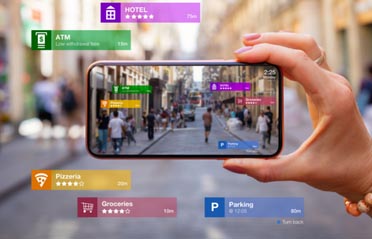Overview
The Retail Industry is Transforming, and Cloud Computing is the activator.
The Covid-19 pandemic has forced retailers across the world to reassess their business models fundamentally. Digital Transformation in the retail sector is moving forward at a previously unknown pace, helping businesses build composable, adaptable, and resilient business models to scale in turbulent environments.
According to a CIO survey conducted by Gartner in 2021 – “nearly two-thirds of retail CIOs believe their relationships with their CEOs have been strengthened during the past year, as CIOs have helped guide their businesses through significant disruption.”
(Read: Importance of Cloud Migration )
Changing Trends in Retail
Today, retail is undergoing an incredible transformation where power is shifting from the retailer to the customer. Consumers are shaping product trends like never before through reviews and social media, doing significant product research online, and want a consistent omnichannel experience across all touchpoints. This puts Retailers under immense pressure to supply new business capabilities to stay competitive quickly.
As a result, retailers’ already slim margins erode, affecting every value chain area. Moreover, the retail sector is evolving beyond the traditional CRM, ERP, and Supply chain management. However, most retailers’ companies are still too rigid to adapt and develop rapidly. In order to stay relevant, retailers must break free from these restraints by adopting the latest and most efficient technologies. Cloud computing can help retailers overcome this hurdle.
Retailers using cloud-based advanced solutions are better equipped to respond to challenges and build long-term resilience for innovation and growth. In addition, the demand for retailers to provide a futuristic shopping experience and bring about digital transformation in the retail industry has boosted cloud adoption.
(Read: Post-COVID Technology Trends in Retail)
Cloud Computing in the Retail Industry
A growing number of industry leaders have recognized the importance of cloud computing in enabling their technological transformation. According to a study, “the retail cloud market is expected to grow at a CAGR of 16.3 % (2021-2026)”.
To stay ahead of the competition in this VUCA (Volatility, Uncertainty, Complexity, and Ambiguity) world, retail businesses must be ready to adapt and innovate.
Cloud services benefit the retail industry in several ways, including lowering IT and storage costs, providing real-time access to operational and inventory data, quicker speed to market, and flexibility to scale up and down when required.
For decades, Walmart has incorporated Cloud-based technology-driven solutions into its business model. As a result, customers can purchase easily and quickly with the help of Microsoft’s cloud and artificial intelligence capabilities.
Cloud computing is also revolutionizing the retail industry by providing improved inventory management, contactless service, enhanced data security, personalized user experience, enhanced profitability, and business continuity & disaster recovery (BCDR).
(Read: While Cloud Adoption May Be An Obvious Choice, Is It Really Secure?)
How Cloud Computing Can Benefit the Retail Industry
1. Efficient Inventory Management
Keeping the inventory in the cloud allows retailers to view inventory data from anywhere and make informed decisions. Storing inventory data on the cloud allows retailers to access it from anywhere at any time.
Also, multiple variables involved in inventory management present significant problems to retailers. Manually tracking them takes a lot of time, but inventory in the cloud can help retailers automate. To solve the difficulties of improving inventory management, retailers can leverage the cloud infrastructure with analytics platforms to construct predictive and prescriptive inventory forecasting engines. Various factors such as seasonality, promotions, trends, product substitutions, and complements may be factored into sophisticated engine projections. These engines can enhance prediction accuracy and predictability of inventory levels.
2. Better Management of Margins and Pricing
When purchasing, pricing is one of the most significant deciding factors for consumers. Retailers must be aware of competition prices, examine sales history at a granular level (sometimes at the store level), forecast re-pricing possibilities, estimate profit and sales implications, and convert the outcomes of these studies into pricing in stores and online.
Unfortunately, this is a manual procedure for most retailers. In addition, data is usually dispersed across various channels, which makes deriving insights time-consuming and inefficient.
Multiple data sources may be ingested and prepared for analysis using Retail Cloud Computing. This can save retailers a lot of time and allow them to concentrate on other critical strategic decisions. Cloud computing also makes it possible to combine data from different sources seamlessly and get insights through machine learning and analytics. As a result, it is vital for decision-makers to thoroughly assess cloud providers, identifying who can quickly build a data platform while also providing intrinsic analytics and best-in-class machine-learning capabilities.
3. Omnichannel Order Fulfilment
According to a recent Gartner “final mile” survey – “Only 18% of organizations report fulfilment accuracy rates of 95% or better.”
Taking an item from the store to complete an online purchase might hurt the business’s sales and profitability, especially if the item’s profit margin is higher in the store than in the online channel. Even if the clients choose in-store pickup, online channels typically lack visibility into shop operations and employees, making it difficult to deliver precise pickup hours.
The cloud platform can provide retail businesses with capabilities to identify the closest stores for the consumers for the product they want, real-time calculation of margins by comparing store pickups with shipping, and accurate order-ready time prediction based on numerous factors.
(Read: Omnichannel Experience and its Importance for Retailers)
4. Enhanced Data Security
Cloud computing is essential for managing massive amounts of sales data, stock/inventory data, customer data, etc. Furthermore, such business-sensitive data should be handled with caution. The loss of valuable corporate data (personally identifiable information) through network infiltration, DDoS attacks, and ransomware is one of the leading reasons for business failure.
Advanced firewalls, Data encryption, event logging, internal firewalls, and physical security help safeguard your data in the cloud.
5. Cost-Effective & Improved Profitability
To fulfil the current market expectations, retailers have been pushed to restructure their operating models and upgrade their technological infrastructure because of the advent of innovative technology solutions. Retailers still using old legacy apps and on-premises infrastructure are gradually migrating their operations to the cloud to cut expenses. Moving to the cloud saves retailers money on IT infrastructure, licensing, maintenance, and support.
Moving to the cloud also helps retailers save time on planning, budget approval for capital expenditures, development, and other operational issues. Cloud Computing also gives retailers the versatility and flexibility to scale up and down without high initial capital requirements.
6. Collaborative Ecosystems
Migrating to the infrastructure also gives way to a collaborative ecosystem where everyone involved in the value chain can work together cooperatively and more efficiently. Retailers, technology providers, consumers, suppliers, and other industry stakeholders can all engage with one another in real-time to produce sustainable value for the customer’s benefit.
Participants in such an ecosystem can collaborate to expand existing company capabilities, support new business models, offer new goods and services, and meet changing customer demands.
7. Business Continuity & Data Recovery
As data has become the most useful tool for retailers to derive insights, protecting this business-sensitive data is extremely important.
This data is traditionally retrieved manually, which is time-consuming and demands ongoing maintenance. However, with the help of the cloud, data can now be viewed and recovered from any location. Disaster recovery and backups can be made from anywhere, and the entire process can be automated.
Concluding Thoughts
Digital transformation is accelerating rapidly across the retail industry & moving to the Cloud has become essential to survive. Cloud Computing provides analytical and AI capabilities that allow retailers to build adaptable, composable business models to scale in disruptive environments.
Choosing the right cloud solution tailored to the business requirement is extremely important to gain a competitive advantage by enhancing the competencies and addressing the weaknesses. HSC has helped a lot of Retail Businesses develop, customize, and deploy unique solutions.

 Product Engineering Services Customized software development services for diverse domains
Product Engineering Services Customized software development services for diverse domains
 Sustenance Engineering Going beyond maintenance to prolong life of mature products
Sustenance Engineering Going beyond maintenance to prolong life of mature products
 Managed Services Achieve scalability, operational efficiency and business continuity
Managed Services Achieve scalability, operational efficiency and business continuity
 Technology Consulting & Architecture Leverage the extensive knowledge of our Domain Experts
Technology Consulting & Architecture Leverage the extensive knowledge of our Domain Experts

























